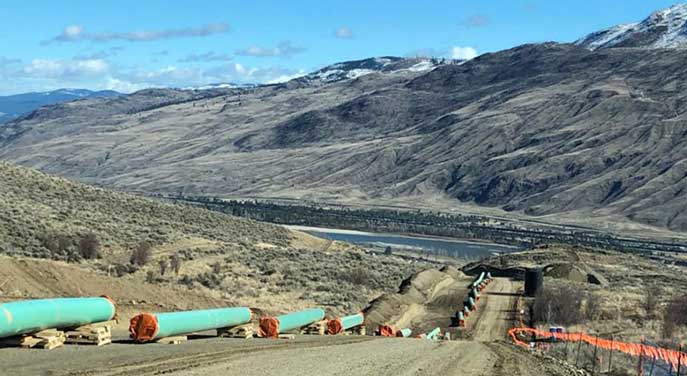 Ottawa needs to finally declare through legislation that the Trans Mountain Expansion Project is to the national advantage of Canada.
Ottawa needs to finally declare through legislation that the Trans Mountain Expansion Project is to the national advantage of Canada.
Doing so would prove to the Canadian public and Indigenous communities that the federal government is serious about seeing it completed.
Make no mistake, killing the project would be devastating for many Indigenous communities along the corridor.
The matter becomes more pressing given the recent report on the project by the Parliamentary Budget Officer (PBO). The PBO determined that the net present value of the pipeline is negative $600 million, leaving it worth about $1.2 billion less than the PBO’s estimate in December 2020. Added costs have also pushed the project’s completion date to the third quarter of 2023.
The PBO also found that cancelling the project would result in a significant loss to the federal government, forcing a write-off of $14.4 billion in assets.
Ottawa has stated it has no plans to cancel the multi-billion-dollar project, yet it could be easy to now hide behind these cost overruns and abort the whole thing. Given the anti-energy bias of this government, that is not impossible to imagine.
We also know there are environmental activists who are conducting a targeted campaign to kill Trans Mountain, now going after investors and insurers. It is critical the government formally defend the pipeline.
The 1,150-km Trans Mountain pipeline carries about 300,000 barrels of oil per day and is the only export pipeline from Alberta to the British Columbia coast. The expansion will increase capacity to about 890,000 barrels per day.
|
Related Stories |
 |
| Busting myths about the Trans Mountain expansion
|
| Imperial signs biggest ever contracts with Indigenous businesses
|
| Oil and gas provides nothing but opportunity for Indigenous peoples
|
The ongoing Russian invasion of Ukraine has shown how dependent many European countries are on Russian oil and natural gas imports. Ottawa’s professed commitment to help NATO allies has finally turned our government’s head to the importance of energy security globally.
But even before the growing global energy crisis, the federal government should have declared through legislation that the Trans Mountain Expansion is to the general advantage of Canada. Particularly because of its importance to Indigenous communities.
The facts speak for themselves. To date, Trans Mountain says it has signed 69 agreements with Indigenous groups in B.C. and Alberta that represent more than $600 million in benefits and opportunities.
This includes training programs for community members, financial compensation, environmental commitments and legacy projects that will last beyond construction, such as projects developing yards that can later be used for housing, schools, soccer fields, or the establishment of a business such as a roadside restaurant or gas station.
The company has stated that, so far, more than 2,500 Indigenous workers have worked on the project, representing 11 percent of the entire workforce.
A vast network of Indigenous-owned and joint venture businesses are participating. So far, more than $3.2 billion has been awarded to Indigenous firms in more than 4,700 contracts.
The Trans Mountain Expansion has also engaged the interest of multiple Indigenous groups – like Nesika Services, Project Reconciliation, and Chinook Pathways – that have come together seeking equity ownership stakes in the project.
These partnerships represent the maturing of Indigenous capital. Strategically dumping Trans Mountain would let these Indigenous groups down and undermine the confidence of Indigenous communities in their ability to work with the federal government on resource projects.
The federal government’s fixation on undermining the energy sector at every turn and its flawed “Just Transition” plan makes it more likely it could abandon the project if conditions were right.
In June, a spokesperson for Deputy Prime Minister Chrystia Freeland stated the project remains in the national interest.
But in 2018, Alberta Senator Douglas Black introduced legislation to formally declare Trans Mountain in the national interest, which would protect the project from disruptions and ensure its completion. However, the Trudeau government allowed that bill to die in the House.
Ottawa must bring in similar legislation and, for the sake of energy security and Indigenous prosperity, ensure the Trans Mountain Expansion gets built now more than ever.
Joseph Quesnel is a Nova Scotia-based consultant with the Canadian Energy Centre who is Quebec Metis by heritage.
For interview requests, click here.
The opinions expressed by our columnists and contributors are theirs alone and do not inherently or expressly reflect the views of our publication.
© Troy Media
Troy Media is an editorial content provider to media outlets and its own hosted community news outlets across Canada.

